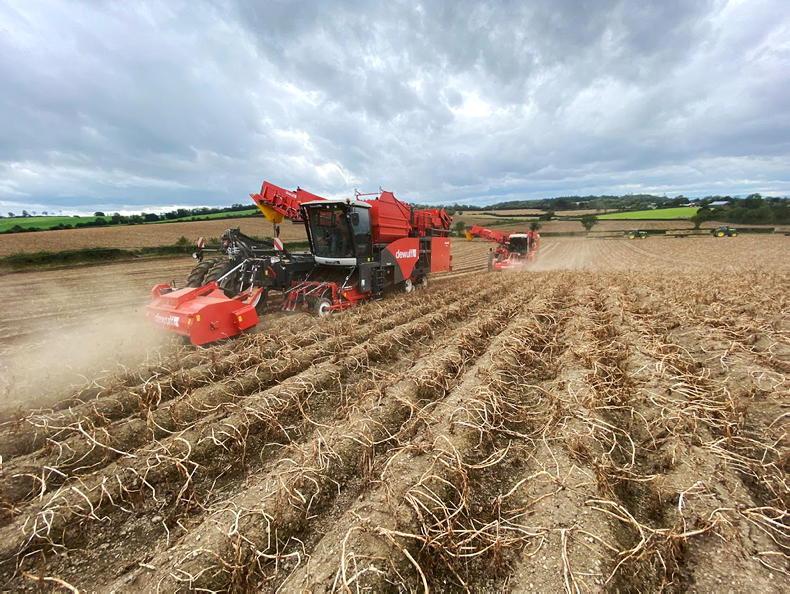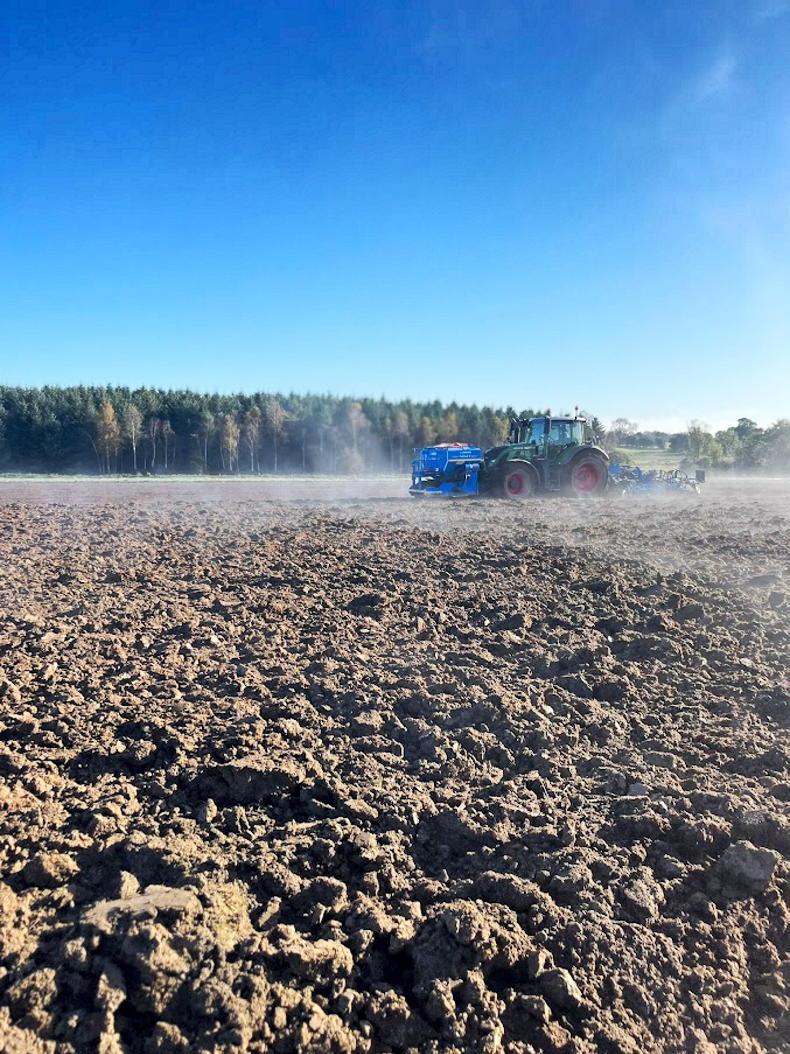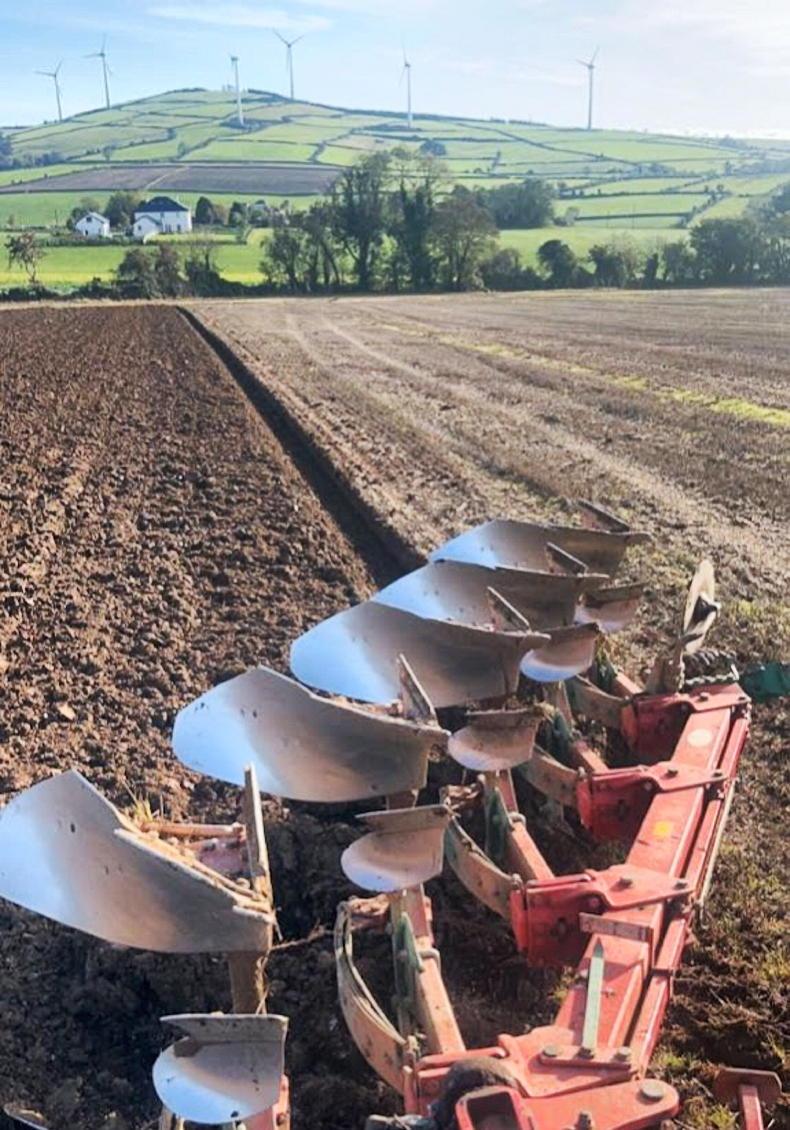Kevin O’Gorman
Castledermot,
Co KildareMaking progress in the fields has been challenging in Kildare, as plenty of rain is making windows of opportunity to get work done very small. There has been 95mm of rain in October at the farm up to last weekend, with 32mm of that in the preceding week, while there does not seem to be any let-up in the forecast either.
The potato harvest began on 4 October. The O’Gorman brothers are now halfway through, with conditions holding up well considering the weather, and good progress is being made at every opportunity. The two self-propelled Dewulf potato harvesters are proving their worth this year. They have a holding bunker with a six-tonne capacity, which allows trailers and all other traffic to be kept to the headlands.
This helps to prevent soil compaction on the majority of the field, and allows for a winter crop to be planted into better conditions post-harvest. The headlands are then sub-soiled when the field is harvested.
Yields are variable, but they are 10 to 20% below average to date. However, tuber quality is quite good.
Autumn planting began with winter barley on 9 October. KWS Tardis was sown at 185kg/ha. Winter wheat followed, with Champion and Graham being drilled at 147kg/ha. Seeding rates will be increased for the remaining cereals to be planted due to the later sowing date and poorer seedbeds.
All ploughing and drilling is being looked after by a local contractor, which allows the O’Gorman brothers to focus on the potato harvest.
The winter oilseed rape has established well and is growing strongly. Kevin notes that the August planting date is very beneficial in a year like this, to spread the workload and get some crops planted early.
He hopes that the weather will give us a break in the coming weeks to allow for the rest of the workload to be completed.

The two potato harvesters have proved their worth this year for the O'Gorman brothers.
Patrick Kehoe
Bunclody,
Co WexfordPatrick took full advantage of the dry weather before storm Babet hit Ireland last week and got all of his winter barley planted. The first of this is just beginning to emerge. Patrick will keep a very close eye on his barley until it is established, as slug pellets may be needed.
Ground conditions were quite good at planting, as the fields have light soil on hilly ground. The fields were ploughed, pressed and one-passed over three days. He notes that the power-harrow creates a very fine seedbed in his soil, which can be an issue with heavy rain, as it can lead to capping and very soft ground.
The varieties planted were KWS Joyau and Integral. These are bothsix-row conventional varieties that claim to have BYDV tolerance. Patrick hopes that BYDV will not be an issue in the crops because of this.
They were sowed at quite a low seeding rate of 150kg/ha, as the thousand grain weight was very low on the seed bags. None of the ground was rolled and no pre-emergence herbicide was applied.
Patrick still hopes to plant some Husky gluten-free winter oats. He knows that it will now depend on the weather, but the ground should dry a bit quicker because it was in spring beans this year, which has left the soil in great condition. He could still plant winter oats up until the first or second week of November.
The cover crops on Patrick’s farm are only okay. They were sowed quite late and have struggled, especially after chopped straw.
One field in which the straw was chopped was only half rolled after planting as the rain arrived, and the difference between the two sides of the field is stark.
The rolled side of the field is much better, with the consolidation helping to improve the seed to soil contact, which is so important, but can be reduced by chopped straw.

The fine weather before Storm Bebet allowed Patrick to plough and sow his winter barley in good conditions.
Alex Butler
Street,
Co WestmeathThe recent heavy rain means Alex’s farm has now recorded over 970mm of rain this year, with an average annual total of 1100mm.
However, he did manage to get a lot of work done before the rain arrived, with all of his lighter land planted and the spring oilseed rape harvested.
This was swarthed for three weeks before being combined, and helped to save the crop during high winds, with very little losses from the swarths. The moisture was quite high, and it was challenging to cut, but it yielded quite well, at 0.6t/ac. This is a good yield as it was a hybrid crop for seed, in which the male and female plants are sowed in strips. The males are then mulched after flowering to leave only the females to be harvested.
The winter oilseed rape is hit and miss. The majority of the crop is good, but about 20% is under pressure on wetter ground and due to slug infestation.
Alex had planned for two more days of drilling before the rain hit last week like many other farmers had. However, he still got a decent amount of work done.
The plough was working a day ahead of the drill to allow some time for the land to soak. Higher seeding rates were used to counter the poorer seedbed conditions, mostly over 200kg/ha. Alex also says that the thousand grain weight of seed varied widely between bags, so calibration was required regularly. KWS Joyau and Belfry were the winter barley varieties.
Alex has got on very well with them in the past couple of years. Graham and Spearhead were the chosen varieties for winter wheat.
The two nights of frost last week made a huge difference to the maize, and it is ready to be harvested. Alex still hopes that some wheat and oats might be planted, but he thinks that time has run out for planting more winter barley.

Winter cereals being planted on Alex's farm.
Kevin O’Gorman
Castledermot,
Co KildareMaking progress in the fields has been challenging in Kildare, as plenty of rain is making windows of opportunity to get work done very small. There has been 95mm of rain in October at the farm up to last weekend, with 32mm of that in the preceding week, while there does not seem to be any let-up in the forecast either.
The potato harvest began on 4 October. The O’Gorman brothers are now halfway through, with conditions holding up well considering the weather, and good progress is being made at every opportunity. The two self-propelled Dewulf potato harvesters are proving their worth this year. They have a holding bunker with a six-tonne capacity, which allows trailers and all other traffic to be kept to the headlands.
This helps to prevent soil compaction on the majority of the field, and allows for a winter crop to be planted into better conditions post-harvest. The headlands are then sub-soiled when the field is harvested.
Yields are variable, but they are 10 to 20% below average to date. However, tuber quality is quite good.
Autumn planting began with winter barley on 9 October. KWS Tardis was sown at 185kg/ha. Winter wheat followed, with Champion and Graham being drilled at 147kg/ha. Seeding rates will be increased for the remaining cereals to be planted due to the later sowing date and poorer seedbeds.
All ploughing and drilling is being looked after by a local contractor, which allows the O’Gorman brothers to focus on the potato harvest.
The winter oilseed rape has established well and is growing strongly. Kevin notes that the August planting date is very beneficial in a year like this, to spread the workload and get some crops planted early.
He hopes that the weather will give us a break in the coming weeks to allow for the rest of the workload to be completed.

The two potato harvesters have proved their worth this year for the O'Gorman brothers.
Patrick Kehoe
Bunclody,
Co WexfordPatrick took full advantage of the dry weather before storm Babet hit Ireland last week and got all of his winter barley planted. The first of this is just beginning to emerge. Patrick will keep a very close eye on his barley until it is established, as slug pellets may be needed.
Ground conditions were quite good at planting, as the fields have light soil on hilly ground. The fields were ploughed, pressed and one-passed over three days. He notes that the power-harrow creates a very fine seedbed in his soil, which can be an issue with heavy rain, as it can lead to capping and very soft ground.
The varieties planted were KWS Joyau and Integral. These are bothsix-row conventional varieties that claim to have BYDV tolerance. Patrick hopes that BYDV will not be an issue in the crops because of this.
They were sowed at quite a low seeding rate of 150kg/ha, as the thousand grain weight was very low on the seed bags. None of the ground was rolled and no pre-emergence herbicide was applied.
Patrick still hopes to plant some Husky gluten-free winter oats. He knows that it will now depend on the weather, but the ground should dry a bit quicker because it was in spring beans this year, which has left the soil in great condition. He could still plant winter oats up until the first or second week of November.
The cover crops on Patrick’s farm are only okay. They were sowed quite late and have struggled, especially after chopped straw.
One field in which the straw was chopped was only half rolled after planting as the rain arrived, and the difference between the two sides of the field is stark.
The rolled side of the field is much better, with the consolidation helping to improve the seed to soil contact, which is so important, but can be reduced by chopped straw.

The fine weather before Storm Bebet allowed Patrick to plough and sow his winter barley in good conditions.
Alex Butler
Street,
Co WestmeathThe recent heavy rain means Alex’s farm has now recorded over 970mm of rain this year, with an average annual total of 1100mm.
However, he did manage to get a lot of work done before the rain arrived, with all of his lighter land planted and the spring oilseed rape harvested.
This was swarthed for three weeks before being combined, and helped to save the crop during high winds, with very little losses from the swarths. The moisture was quite high, and it was challenging to cut, but it yielded quite well, at 0.6t/ac. This is a good yield as it was a hybrid crop for seed, in which the male and female plants are sowed in strips. The males are then mulched after flowering to leave only the females to be harvested.
The winter oilseed rape is hit and miss. The majority of the crop is good, but about 20% is under pressure on wetter ground and due to slug infestation.
Alex had planned for two more days of drilling before the rain hit last week like many other farmers had. However, he still got a decent amount of work done.
The plough was working a day ahead of the drill to allow some time for the land to soak. Higher seeding rates were used to counter the poorer seedbed conditions, mostly over 200kg/ha. Alex also says that the thousand grain weight of seed varied widely between bags, so calibration was required regularly. KWS Joyau and Belfry were the winter barley varieties.
Alex has got on very well with them in the past couple of years. Graham and Spearhead were the chosen varieties for winter wheat.
The two nights of frost last week made a huge difference to the maize, and it is ready to be harvested. Alex still hopes that some wheat and oats might be planted, but he thinks that time has run out for planting more winter barley.

Winter cereals being planted on Alex's farm.









 This is a subscriber-only article
This is a subscriber-only article










SHARING OPTIONS: